About the Welcommon project during COVID-19
For the past 2 weeks Greece has been in lockdown (again), which means that everyone is supposed to stay home. Unfortunately some people don’t have a home and if it wasn’t for the Welcommon Hostel’s decision to remain open, a number of refugees would be left living (again) in the streets. In WELCOMMON HOSTEL we host 50 people during this lockdown-2.
Today, we are looking for funding or donations. Go to https://gogetfunding.com/welcommon/ to support two social projects:
- Housing of vulnerable refugees in the Welcommon Hostel during COVID-19 and especially lockdown2
- Providing intercultural classes and activities (language skills, job preparation, art therapy, etc.)
Anemos Ananeosis / Wind of Renewal was founded as a social cooperative in Athens in 2014. Born out of a desire to promote social and green innovation and economy, climate protection, energy transition, environmental awareness, intercultural dialogue, welcome refugees – providing safe accommodation and social inclusion. The WELCOMMON HOSTEL is an innovative hostel with social and green impact created and run by our social cooperative since July 2018, initially intended to be self-financed by tourism, and with a vision to bring people from all over the world together, by providing educational and intercultural activities for refugee communities in Athens, local Greeks and travelers. As a cooperative we don’t share profits, if there is we invest it in new jobs, social, climate and green activities. For 1,5 year (September 2016 to Ferbruary 2018) Anemos Ananeosis provided accommodation in dignity, empowerment and non-formal education for more than 600 refugees in the WElCOMMON, a centre for refugees based on the “empowerment through building communities” model.

What’s the problem and how are we addressing it?
As of June 2020, even the sustainable tourism collapsed and at the same time thousands of recognized refugees and asylum seekers in Greece have been facing eviction from the greek government / EU funded accommodation, as a result of a new government plan, which has already left many refugees homeless in the midst of a global pandemic. This includes many vulnerable asylum seekers, such as survivors of sexual violence, torture and ill treatment, the elderly, and people with chronic diseases, pregnants and mothers with new borned babies.
The vision for the Welcommon Hostel, opened in 2018, was to be a sustainable solution to host all the travelers. If you’ve ever come into the Welcommon you probably felt that it is a special place, a place where you can meet people, learn from them… it is a community. Special place, people, values.

Five floors of the seven storey building can provide accommodation to up to 167 people.
Two floors of the Welcommon hostel are dedicated to our social activities, providing opportunities to guests, international volunteers and refugees to collaborate and learn together. Our hostel is also a place for social and cultural exchange. Here, Greek locals, refugees, volunteers and tourists come together to eat, to drink, to discuss or to play card games.

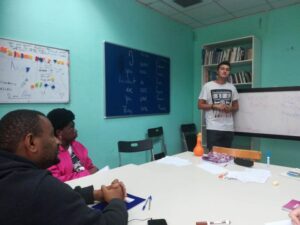

Housing of vulnerable refugees during COVID-19
With the current situation in the camps and the streets of Athens and during COVID-19, it became vital to offer emergency and long-term accommodation for refugees, not only lessons. This is why we are open for collaboration and looking for resources, common projects and/or donations to finance this initiative. Therefore, during this new lockdown we are hosting 50 people from Afghanistan, Turkey, Syria, Lebanon, Algeria, Palestine, Congo etc. Our objective is to find resources to host 60 to 80 people currently living in the street or in camps and support their return to society, focusing on vulnerable. Recenlty, we hosted the 51st newborn baby (and her family), and soon we will host the 52d one, since September 2016.
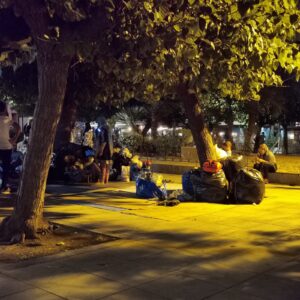



Accommodation to volunteers
We offer accommodation to volunteers coming from all over Europe and the world – some of them #EuropeanSolidarityCorps participants – to participate in our activities and provide the space for the intercultural lessons and activities. Since 2016, more than 330 volunteers participated in organising non formal education language classes, art therapy courses and socializing events with over 1500 refugees. The aim is to promote social inclusion and support refugees in restarting their lives and help them to become more independent but also to promote collaboration, respect and learning each other.

Intercultural classes and activities during COVID-19 and lockdown
Our plan, is to provide accommodation for refugee communities, but also to help them with education, empoewerment and integration by providing educational and intercultural activities and job preparation even during COVID-19 and lockdown-2.
Our activities during COVID-19: The activities came to a complete stop during the Covid-19 lockdown-1 (March – May 2020) and restarted in limited capacity in June 2020 because of the small number of volunteers and lack of financial resources. Throughout the summer extra volunteers brought their enthusiasm and motivation to the project. From June to November 2020 (before the lockdown2) we offered the posibility to 110 refugees to participate in non-formal education, intercultural lessons. Most of the participants in the courses are teenagers and women.

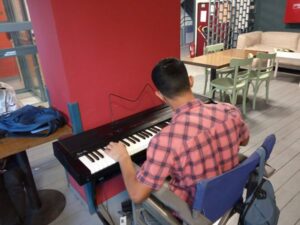
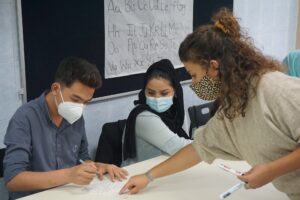
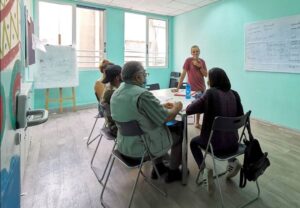
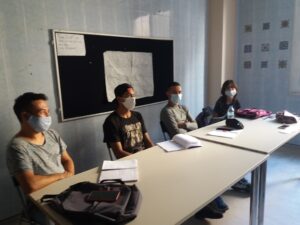
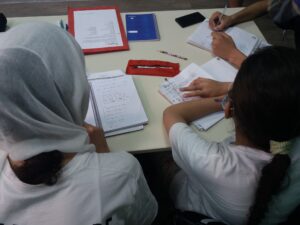
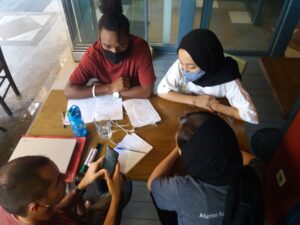

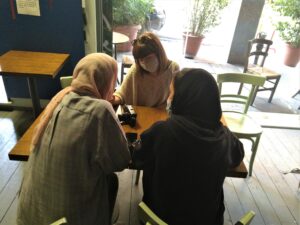
Our activities during the lockdown-2: Since the 7th of November 2020, we had to cancel the courses for refugees from outside the hostel (camps and appartments) participating in the classes, because of the restrictions in mobility and of the health protocols. Our volunteers are re-organising the life in the hostel with activities, classes, daily chores, cleaning, etc… In the end, this lockdown is a good opportunity to get to know each other and to share our stories, our skills. We created a new schedule for the about 50-60 residents (refugees) of the Welcommon Hostel with different kinds of language classes (english, french, german, art) and projects for teenagers, children and adults! The children living in the hostel during COVID-19 and lockdown learn language, painting, maths with the help of our volunteers in the kids rooms! To make the best out of this lockdown and make it a productive time, the volunteers also organised all the resources that we have at the hostel to be able to be more efficient for the classes.
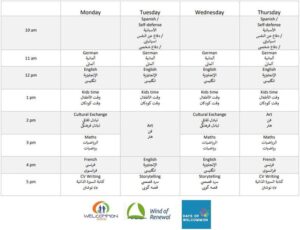

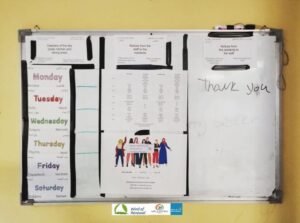
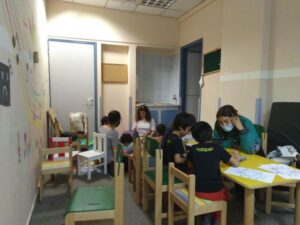
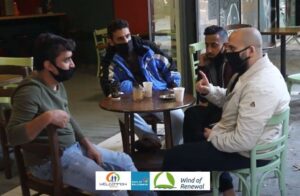
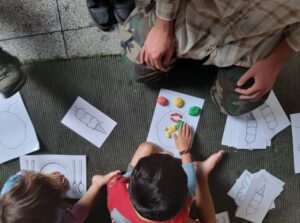
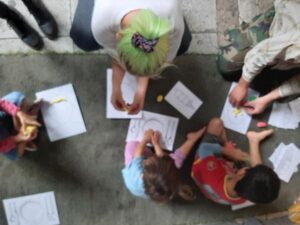
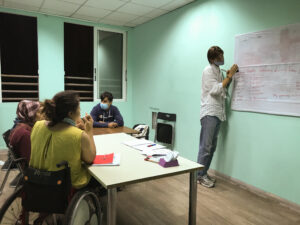

Why we need your help?
Since reopening the hostel in June, we have hosted in our hostel a few tourists by moslty refugees and asylum seekers, including many vulnerable cases, thanks to the collaboration with organizations such as Greek Council of Refugees, Greek Refugees Forum, women organisation DIOTIMA.
Unfortunately both us and other NGO’s active in Athens have limited resources, and can only manage to help a certain amount of people, while many more people, including many vulnerable refugees are still homeless, and living in streets of Athens.
But lockdown means no tourism, which means no income, which means it is difficult to pay the total cost (rent, bills, taxes and fees, cleaning material and personnel, laundry, staff, consumables. colors, papers etc). We need an amount – additional to what we can finance – of at least 450 Euro for 2 persons for a month, which means that we need your help!
We need your help to keep the project going!
—————————————————————————————————————————————————————
- To financially support us go to: https://gogetfunding.com/welcommon/
or direct to our bank accounts:
—————————————————————————————————————————————————————
ANEMOS ANANEOSIS / WIND OF RENEWAL
- Cooperative Bank of Karditsa
ΙΒΑΝ GR 7608900100003010003540200
Swift Code STKAGRA1
————————————————————————————————————————————————————————–
ANEMOS ANANEOSIS / WIND OF RENEWAL
IBAN: GR83 0172 0180 0050 1807 7868 253
Piraeus’s BIC code is PIRBGRAA
Don’t forget to send us (windofrenewal@gmail.com) your details. We need name, address, country, VAT No in order to be able to issue the receipt for your donation
And if you can’t donate, remember that sharing is caring! Thank you
#lockdowndiary #windofrenewal #welcommonhostel #socialwork #volunteering
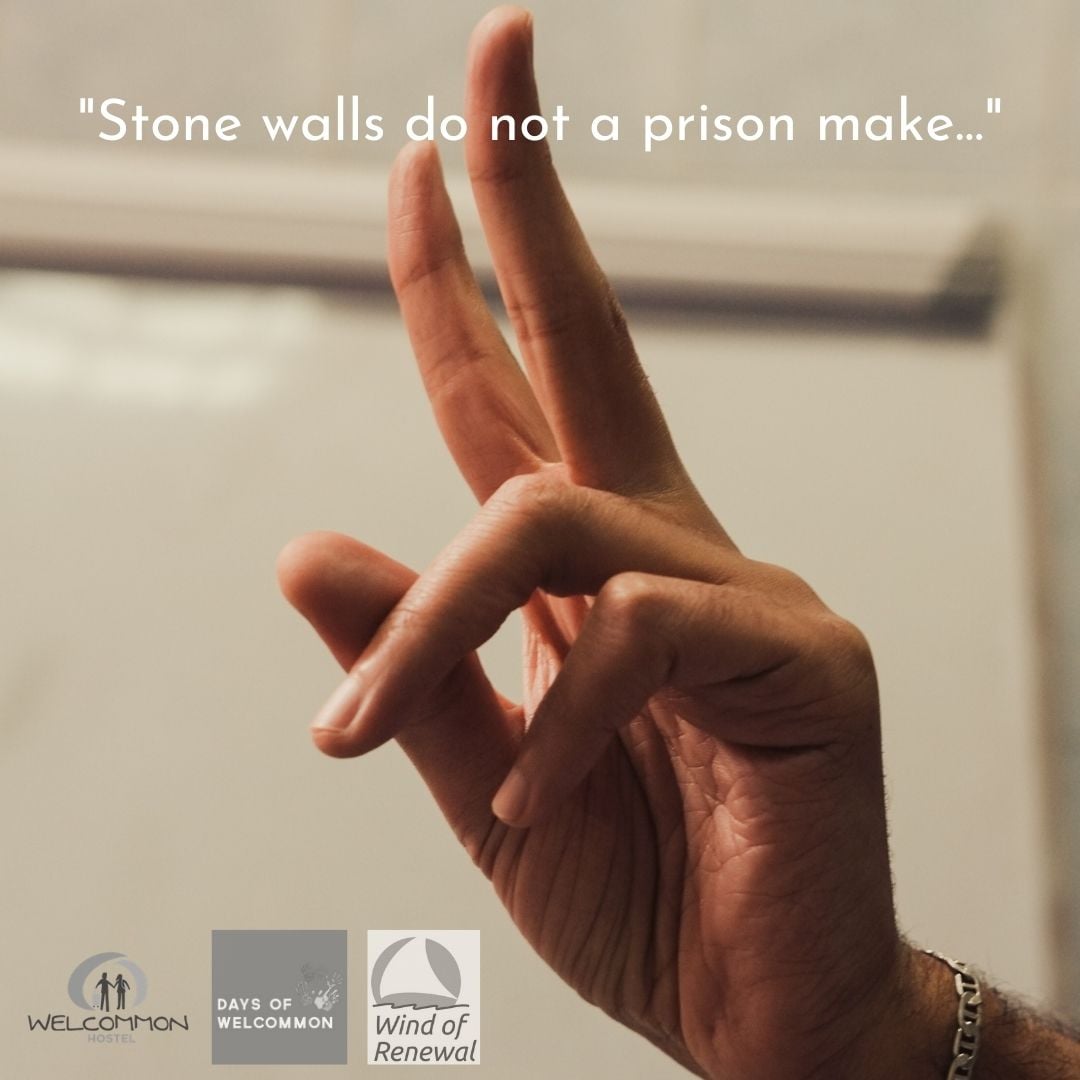































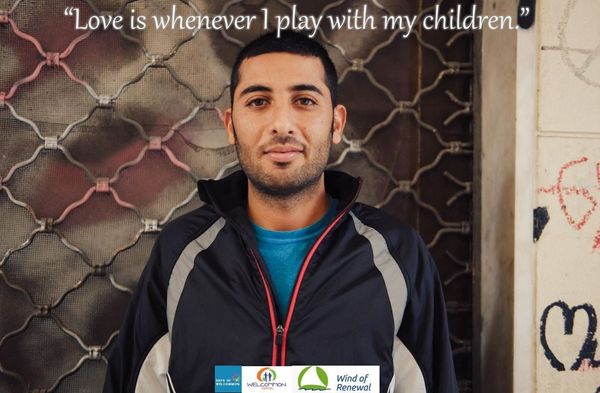


Recent Comments